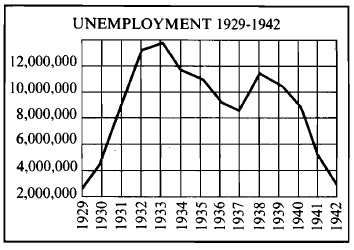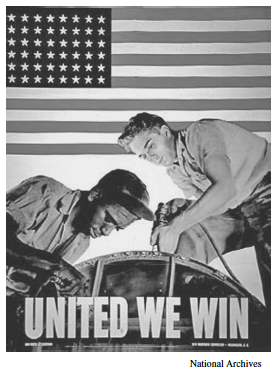Period 7- Week 5: AP Classroom
1/22
There's no tags or description
Looks like no tags are added yet.
Name | Mastery | Learn | Test | Matching | Spaced |
|---|
No study sessions yet.
23 Terms
Short answer
Analyze the home-front experiences of two of the following groups; African Americans, Japanese-Americans, Jewish-Americans, Mexican- Americans
DBQ
Evaluate the extent of difference between American women’s experiences in WW1 and WW2
LE
Describe a cause of U.S. involvement in the war, explain the similarities between the U.S. economy in 1941-1960 and 1920-1940, how did the U.S. economy change from 1941-1960 from WW2

Which of the following was most responsible for the change shown between 1938 and 1942 on the chart above?
Industrial mobilization related to the Second World War

Which of the following messages did the United States government most likely intend to impart in the Second World War poster pictured above?
Encouragement of greater acceptance of African American workers in wartime industrial jobs
“Since the 1890s, despite the abolition of slavery and the three Reconstruction amendments to the Constitution, Jim Crow segregation pervaded every aspect of American society. The military was no exception. Following the Japanese sneak attack on Pearl Harbor, black men who volunteered for duty or were drafted were relegated to segregated divisions and combat support roles, such as cook, quartermaster, and grave digger. The military was as segregated as the Deep South.
“It was difficult for African Americans not to see the hypocrisy between conditions at home and the noble war aims that President Franklin Roosevelt articulated in his famous ‘Four Freedoms’ speech on January 6, 1941. And because of the gap between the promise and the performance of American freedom when it came to race relations, many black people frankly felt alienated from the war effort.
“Despite this discrimination, more than 2.5 million African Americans registered for the draft when World War II began; 1 million served. A key voice in the war effort was the Pittsburgh Courier, the nation’s most widely read African-American newspaper. Two months after the attack on Pearl Harbor, the Courier launched a national campaign that urged black people to give their all for the war effort, while at the same time calling on the government to do all it could to make the rhetoric of the Declaration of Independence and the equal rights amendments to the Constitution real for every citizen, regardless of race. In honor of the battle against enemies from without and within, they called it the Double V campaign.”
Henry Louis Gates, Jr., historian, “How Was Black Support Enlisted for World War II, When the Armed Services Were Segregated?,” 2017
Which of the following best explains an effect of the events described in the excerpt?
African American socioeconomic standing improved overall.
All of the following have been cited as reasons for the dropping of atomic bombs on Japan in 1945 EXCEPT the need to
block a planned Japanese invasion of the United States
American participation in the Second World War had which of the following major effects on the home front?
A movement of women into factory work
Despite its isolationist position in the 1920’s, the United States government actively intervened throughout the decade in which of the following areas of European affairs?
International finance and reparations
During the Second World War, Japanese Americans were relocated because of
fear of possible subversive activity against the war effort
“The Communists are in China to stay. And China’s destiny is not [Chinese nationalist leader Jiang Jieshi’s] but theirs. In this unhappy dilemma, the United States should attempt to prevent the disaster of a civil war through adjustment of the new alignment of power in China by peaceful process. The desirable means to this end is to encourage the reform and revitalization of the Kuomintang [Nationalist Party of China] so that it may survive as a significant force in a coalition government [with the Chinese Communist Party]. If this fails, we must limit our involvement with the Kuomintang and must commence some cooperation with the Communists, the force destined to control China, in an effort to influence them further into an independent position friendly to the United States. We are working against time because, if the USSR enters the war against Japan and invades China before either of these alternatives succeeds, the Communists will be captured by the USSR and become Soviet satellites.”
John Paton Davies, United States diplomat in China, “Observations on the Struggle for Power in China,” 1943
The purpose of the excerpt is best explained as promoting which of the following?
Negotiating a peaceful settlement in China to limit Soviet influence after the Second World War
One major effect of the Second World War was increased opportunities for women in
industrial employment
Which of the following best explains the factor that prompted United States involvement in military actions during the Second World War?
Japan conducted a surprise attack on a United States military base
“In the future days, which we seek to make secure, we look forward to a world founded upon four essential human freedoms.
“The first is freedom of speech and expression—everywhere in the world.
“The second is freedom of every person to worship God in his own way—everywhere in the world.
“The third is freedom from want—which, translated into world terms, means economic understandings which will secure to every nation a healthy peacetime life for its inhabitants—everywhere in the world.
“The fourth is freedom from fear—which, translated into world terms, means a world-wide reduction of armaments to such a point and in such a thorough fashion that no nation will be in a position to commit an act of physical aggression against any neighbor—anywhere in the world.”
President Franklin D. Roosevelt, State of the Union address, January 1941
Roosevelt’s speech was most likely intended to increase public support for“In the future days, which we seek to make secure, we look forward to a world founded upon four essential human freedoms.
“The first is freedom of speech and expression—everywhere in the world.
“The second is freedom of every person to worship God in his own way—everywhere in the world.
“The third is freedom from want—which, translated into world terms, means economic understandings which will secure to every nation a healthy peacetime life for its inhabitants—everywhere in the world.
“The fourth is freedom from fear—which, translated into world terms, means a world-wide reduction of armaments to such a point and in such a thorough fashion that no nation will be in a position to commit an act of physical aggression against any neighbor—anywhere in the world.”
President Franklin D. Roosevelt, State of the Union address, January 1941
Roosevelt’s speech was most likely intended to increase public support for“In the future days, which we seek to make secure, we look forward to a world founded upon four essential human freedoms.
“The first is freedom of speech and expression—everywhere in the world.
“The second is freedom of every person to worship God in his own way—everywhere in the world.
“The third is freedom from want—which, translated into world terms, means economic understandings which will secure to every nation a healthy peacetime life for its inhabitants—everywhere in the world.
“The fourth is freedom from fear—which, translated into world terms, means a world-wide reduction of armaments to such a point and in such a thorough fashion that no nation will be in a position to commit an act of physical aggression against any neighbor—anywhere in the world.”
President Franklin D. Roosevelt, State of the Union address, January 1941
Roosevelt’s speech was most likely intended to increase public support for
aiding the Allies in Europe during the Second World War
The American home front in the Second World War is best described as
economically invigorated by military spending
The bracero program encouraged
Mexican workers to come to the United States as temporary laborers from the 1940s to the 1960s
The purpose of the Lend-Lease Act was to
provide military supplies to the Allies
The Rosie the Riveter campaign during the Second World War encouraged women to
enter the labor force
The Supreme Court ruling in Korematsu v. United States upheld the constitutionality of
the internment of Japanese Americans as a wartime necessity
Which of the following ways best explains how the United States attempted to influence the outside world following the conclusion of the First World War?
It used trade and investment in order to maintain international connections.
Which of the following best describes the experience of Americans of Japanese descent during the Second World War?
They were forced from their homes and businesses on the West Coast into detention camps.
Which of the following was a common experience on the United States home front during the Second World War?
Rationing of basic consumer goods
Which of the following was Harry Truman’s stated reason for authorizing the use of the atomic bomb against Japan?
Using the atomic bomb would prevent the need for a costly invasion of Japan.